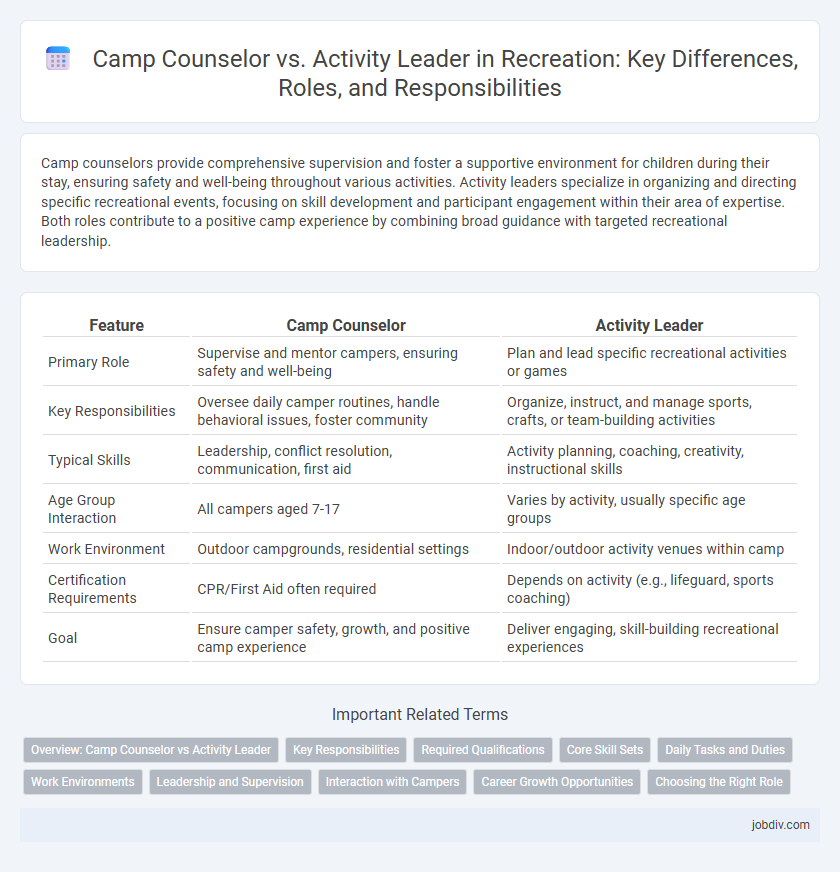Camp counselors provide comprehensive supervision and foster a supportive environment for children during their stay, ensuring safety and well-being throughout various activities. Activity leaders specialize in organizing and directing specific recreational events, focusing on skill development and participant engagement within their area of expertise. Both roles contribute to a positive camp experience by combining broad guidance with targeted recreational leadership.
Table of Comparison
| Feature | Camp Counselor | Activity Leader |
|---|---|---|
| Primary Role | Supervise and mentor campers, ensuring safety and well-being | Plan and lead specific recreational activities or games |
| Key Responsibilities | Oversee daily camper routines, handle behavioral issues, foster community | Organize, instruct, and manage sports, crafts, or team-building activities |
| Typical Skills | Leadership, conflict resolution, communication, first aid | Activity planning, coaching, creativity, instructional skills |
| Age Group Interaction | All campers aged 7-17 | Varies by activity, usually specific age groups |
| Work Environment | Outdoor campgrounds, residential settings | Indoor/outdoor activity venues within camp |
| Certification Requirements | CPR/First Aid often required | Depends on activity (e.g., lifeguard, sports coaching) |
| Goal | Ensure camper safety, growth, and positive camp experience | Deliver engaging, skill-building recreational experiences |
Overview: Camp Counselor vs Activity Leader
Camp Counselors oversee campers' daily routines, ensuring safety and fostering social development, while Activity Leaders specialize in planning and leading specific recreational activities like sports, arts, or games. Counselors build strong relationships with participants to promote a supportive camp environment, whereas Activity Leaders focus on delivering skill-based or creative programs. Both roles require leadership, communication skills, and a passion for engaging youth in positive, structured recreational experiences.
Key Responsibilities
Camp counselors oversee the overall safety and well-being of campers, managing daily routines, supervising activities, and providing emotional support. Activity leaders specialize in planning and executing specific recreational activities such as sports, arts, or educational workshops, ensuring skill development and engagement. Both roles require strong communication, leadership, and organizational skills, but camp counselors focus more on camper care while activity leaders emphasize program delivery.
Required Qualifications
Camp counselors typically require certifications in CPR and first aid, along with experience in child supervision and basic leadership skills. Activity leaders often need specialized training or expertise related to the specific activities they manage, such as sports coaching, arts instruction, or adventure guiding. Both roles benefit from strong communication abilities and a background in youth development or recreational program coordination.
Core Skill Sets
Camp counselors excel in interpersonal communication, conflict resolution, and emotional support, fostering a safe and inclusive environment for campers. Activity leaders specialize in planning, organizing, and executing engaging recreational programs with strong leadership and time management skills. Both roles require adaptability and problem-solving abilities to ensure a positive and dynamic camp experience.
Daily Tasks and Duties
Camp counselors supervise campers by ensuring safety, organizing daily schedules, and facilitating group activities to promote social interaction. Activity leaders specialize in planning and leading specific recreational programs such as arts and crafts, sports, or nature exploration, tailoring experiences to skill levels and interests. Both roles require strong communication, leadership skills, and the ability to adapt quickly to changing group dynamics in a camp setting.
Work Environments
Camp counselors typically work in outdoor settings such as summer camps, youth retreats, and nature centers, engaging directly with children and teens in activities like hiking, swimming, and team sports. Activity leaders often operate in more diverse environments, including community centers, resorts, and schools, where they design and facilitate structured group activities such as arts and crafts, games, and fitness classes. Both roles require adaptability to dynamic social settings, but camp counselors predominantly navigate rustic, nature-based venues while activity leaders manage indoor and mixed-use recreational spaces.
Leadership and Supervision
Camp counselors provide direct leadership by guiding campers through daily routines, ensuring safety, and fostering a supportive environment. Activity leaders specialize in supervising specific recreational activities, delivering structured instruction and maintaining participant engagement. Both roles require strong communication skills and the ability to manage groups effectively, but camp counselors oversee overall camper well-being, while activity leaders focus on the success of individual programs.
Interaction with Campers
Camp counselors focus on building close relationships with campers through daily support, guidance, and emotional encouragement, fostering a safe and inclusive environment. Activity leaders primarily engage with campers during specific programs or events, motivating participation and teaching new skills related to their specialized activities. Both roles require strong communication and interpersonal skills but differ in the depth and frequency of camper interaction throughout the camp experience.
Career Growth Opportunities
Camp counselors develop strong leadership and communication skills through direct interaction with campers, which lays a foundation for career growth in education, social work, or youth development. Activity leaders gain specialized expertise in organizing and managing recreational programs, enhancing their qualifications for advanced roles in event planning, sports management, or outdoor education. Both positions offer pathways to supervisory roles, program coordination, and professional certifications that support long-term career advancement in the recreation industry.
Choosing the Right Role
Selecting the right role in recreation depends on individual skills and interests; camp counselors prioritize camper supervision, safety, and emotional support, fostering a nurturing environment. Activity leaders design and facilitate specific programs, requiring expertise in particular recreational activities and group engagement techniques. Understanding these distinctions optimizes job performance and enhances participant experiences.
Camp Counselor vs Activity Leader Infographic

 jobdiv.com
jobdiv.com